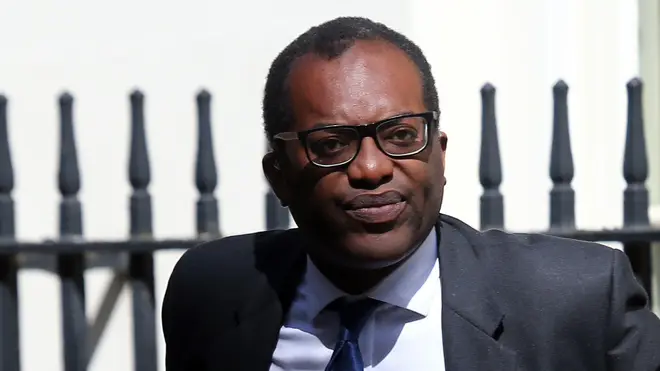
Clare Foges 6pm - 9pm
20 September 2021, 17:04 | Updated: 21 September 2021, 10:33

Business Secretary Kwasi Kwarteng has said there will be "no question of the lights going out this winter" amid rising gas prices, describing warnings as "alarmist".
He also insisted the Government will "not be bailing out failed companies" as a result of the crisis and added the energy price cap will remain in place.
Mr Kwarteng was addressing MPs after holding talks with the industry on Monday.
READ MORE: Gas price crisis: Taxpayers 'face multibillion pound bill' bailing out energy firms
READ MORE: Gas prices: What happens if my energy supplier goes bust?
Wholesale prices for gas have surged 250% since January, with a 70% rise since August alone – leading to calls for support from the industry and the collapse of some smaller energy firms.
Mr Kwarteng told MPs: "We have sufficient capacity, and more than sufficient capacity, to meet demand and we do not expect supply emergencies to occur this winter.
"There is absolutely no question of the lights going out or people being unable to heat their homes. There will be no three-day working weeks or a throwback to the 1970s. Such thinking is alarmist, unhelpful and completely misguided."

Energy crises can be dodged in future with renewable investment
He added: "The Government will not be bailing out failed companies. There will be no rewards for failure or mismanagement.
"The taxpayer should not be expected to prop up companies which have poor business models and are not resilient to fluctuations in price."
Mr Kwarteng told the Commons the Government also wanted to protect customers, including vulnerable people, from "price spikes".
He said: "We must not suddenly return to the 'cosy oligopoly' of years past where a few large supplies simply dictated to customers conditions and pricing."
He added: "The energy price cap, which saves 15 million households up to £100 a year, is staying. It's not going anywhere.

Caller's CO2 shortage meat warning
"Our priority in this situation has to be the consumer, the Great British public, and the cap has done that effectively. It protects and has protected millions of customers from sudden increases in global prices this winter.
"We're committed to that price cap and it'll remain in place."
It comes as Mr Kwarteng released a joint statement with Ofgem head Jonathan Brearley on Monday evening.
"We want to be clear that this is not an issue of supply - the United Kingdom benefits from having a diverse range of gas supply sources with capacity that can more than meet demand," it said.
"This morning we hosted a roundtable with leading energy suppliers and consumer groups to hear about the challenges they currently face.
"There was overarching consensus among meeting participants that the top priority must be ongoing support for energy customers, especially the elderly and vulnerable.
"In the event an energy supplier fails, we are committed that consumers face the least amount of disruption possible - and there are clear and well-established processes in place to ensuring this is the case.
"In the coming days, we will also meet with smaller and challenger energy suppliers and set out the next steps for protecting consumers, businesses and energy suppliers from these global prices rises.
"Central to any next steps is our clear and agreed position that the energy price cap will remain in place."

Is the energy crisis down to Brexit?
However, shadow business secretary Ed Miliband warned that UK families were going to be hit by a "triple whammy" of tax rises, fuel costs and the end of the Universal Credit uplift this winter.
He called on the Government to cancel its plans to end the £20-a-week uplift.
Mr Miliband told MPs: "The rise in the price cap of £139 means half-a-million more families will be plunged into fuel poverty. At a minimum he should be looking at making the operation of the £140 warm homes discount automatic and possibly extending it, but even that will not be enough.
"Families are facing a triple whammy: rising energy prices, national insurance rises and at the end of this month, the £1,000 cut in Universal Credit. These energy price rises turn the indefensible decision on Universal Credit into an unconscionable one."